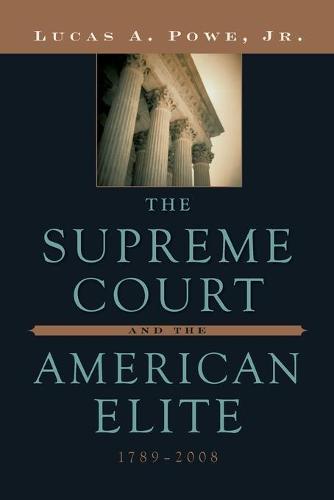Awards
- Nominated for James Willard Hurst Prize 2010
- Nominated for John Phillip Reid Book Award 2010
Overview
""The Supreme Court follows the election returns,"" the fictional Mr. Dooley observed a hundred years ago. And for all our ideals and dreams of a disinterested judiciary, above the political fray, it seems Mr. Dooley was right. In this engaging-and disturbing-book, a leading historian of the Court reveals the close fit between its decisions and the nation's politics. The story begins with the creation of the Constitution and ends with the June 2008 decisions on the rights of detainees at Guantánamo Bay. Rendering crisp (and often controversial) judgments on key decisions from Marbury v. Madison to the War on Terror, Lucas Powe shows how virtually every major Supreme Court ruling, however deftly framed in constitutional terms, suited the wishes of the most powerful politicians of the time. This history reflects a changing Court, from the country's early struggles over commerce and transportation to the torturous justifications of slavery before the Civil War, to a post–New Deal interest in ending segregation, controlling criminal procedure, and addressing knotty questions arising from the Cold War. Through all of this the Court emerges as part of a ruling regime, doing its best to implement the regime's policies. Drawing on more than four decades of thinking about the Supreme Court and its role in the American political system, this book offers a new, clear, and troubling perspective on American jurisprudence, politics, and history.
Full Product Details
Author: Lucas A. Powe
Publisher: Harvard University Press
Imprint: Harvard University Press
Dimensions:
Width: 14.00cm
, Height: 2.60cm
, Length: 21.00cm
Weight: 0.386kg
ISBN: 9780674060418
ISBN 10: 0674060415
Pages: 432
Publication Date: 31 May 2011
Audience:
General/trade
,
General
Format: Paperback
Publisher's Status: Out of Print
Availability: In Print

Limited stock is available. It will be ordered for you and shipped pending supplier's limited stock.
Reviews
A leading historian of the Supreme Court, Powe decries what he calls the Imperial Court, which he sees as overly concerned with solidifying its primacy through a series of pretentious opinions. He details a litany of cases in which the Rehnquist Court overturned positive, progressive, and proactive legislation designed to protect and improve society, instead turning to rigid interpretation in an overreaching attempt to stifle congressional authority, as granted by the Constitution. Powe links the Supreme Court's late 20th-century mindset change with the ascendancy of a Republican majority in Congress, which began with the 1994 elections and continued until the mid-term election of 2006. As the author convincingly argues, surfing waves of electoral sentiment is a bad move for a Court cognizant of its historical legacy, and it may some day regret its decisions to invalidate the Violence Against Women Act, strike down the Gun Free School Zones Act, and abrogate damage-remedy provisions under both the Age Discrimination and Americans with Disabilities Acts. -- Philip Y. Blue Library Journal 20090415 Powe has certainly written a book that is entertaining, quirky, idiosyncratic, fun to read, and more than occasionally insightful. It does blend together legal doctrine and American politics, and as a result the history is richer--and more complete--than the usual account. -- Lawrence M. Friedman American Prospect 20090401
A leading historian of the Supreme Court, Powe decries what he calls the Imperial Court, which he sees as overly concerned with solidifying its primacy through a series of pretentious opinions. He details a litany of cases in which the Rehnquist Court overturned positive, progressive, and proactive legislation designed to protect and improve society, instead turning to rigid interpretation in an overreaching attempt to stifle congressional authority, as granted by the Constitution. Powe links the Supreme Court's late 20th-century mindset change with the ascendancy of a Republican majority in Congress, which began with the 1994 elections and continued until the mid-term election of 2006. As the author convincingly argues, surfing waves of electoral sentiment is a bad move for a Court cognizant of its historical legacy, and it may some day regret its decisions to invalidate the Violence Against Women Act, strike down the Gun Free School Zones Act, and abrogate damage-remedy provisions under both the Age Discrimination and Americans with Disabilities Acts. -- Philip Y. Blue Library Journal 20090415 Powe has certainly written a book that is entertaining, quirky, idiosyncratic, fun to read, and more than occasionally insightful. It does blend together legal doctrine and American politics, and as a result the history is richer--and more complete--than the usual account. -- Lawrence M. Friedman American Prospect 20090401
Author Information
Lucas A. Powe, Jr. holds the Anne Green Regents Chair at the University of Texas, where he teaches in the School of Law and the Department of Government.




